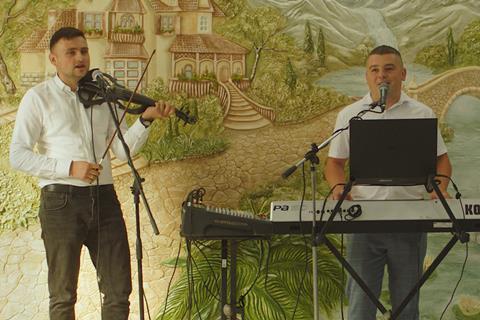Docu-fiction exploring the enduring legacy of Yiddish klezmer music won the first feature award at Berlin

Dirs/scr: Leandro Koch, Paloma Schachmann. Austria/Argentina. 2023. 117mins
A search for the practitioners of a vanishing musical style becomes a quest for home in The Klezmer Project, the playful but poignant full-length debut from Argentianian writer-directors Leandro Koch and Paloma Schachmann. This self-described docu-fiction finds the filmmakers playing versions of themselves on a fact-finding mission across Eastern Europe to chronicle the traditional Yiddish folk music known as klezmer, scripted sequences interweaving with footage of actual performers and ethnomusicologists discussing the artform. What emerges is a history lesson but also a personal journey of sorts for Koch and Schachmann, grandchildren of Jewish immigrants who discover an emotional connection to their cultural roots along the way.
What emerges is a history lesson but also a personal journey of sorts
The Klezmer Project premiered in Berlin’s Encounters section, winning the festival’s GWFF Best First Feature Award, and could be an appealing option for future festivals — especially ones that focus on music or documentaries. Also, The Klezmer Project’s memorialising of the Holocaust and the struggles faced by Jews ever since makes this a useful educational tool for younger viewers.
As the film begins, Koch is living in Buenos Aires, where he works as a wedding videographer. He meets Schachmann, who plays in a klezmer band, at a musical event. Trying to impress her, he claims he is making a documentary about klezmer – although he does not know much about the upbeat genre, which often incorporates violins, accordions and clarinets. But Schachmann calls his bluff, setting in motion the making of such a film, the pair travelling from Austria and Ukraine to Romania and Moldova to seek out klezmer musicians and learn more about its connection to Jewish culture — and also why the musical style is disappearing.
Throughout much of The Klezmer Project, voiceover narration recounts a story, set in the early 20th century, in which a gravedigger named Yankel lies about his knowledge of the Torah to be close to the rabbi’s beautiful daughter Taibele — the young man’s lie mirroring Koch’s fibs to Schachmann about his interest in Yiddish folk music. Repeatedly, that tale will have echoes in this modern-day chronicling of klezmer as the fictionalised versions of Koch and Schachmann fall in love while making their documentary.
The picture is fascinating as both an investigation of a particular musical style and an exploration of its place in Jewish culture — specifically Yiddish culture. Like Yankel, the onscreen Koch does not have much interest in Judaism but, over the course of The Klezmer Project, he will acquire a newfound appreciation by understanding how the music’s waning relevance reflects tensions within the Jewish community. Through their conversations with musicians and experts, the writer-directors use klezmer as a springboard to unravel how internal disagreements among Jews between choosing Hebrew or Yiddish as the dominant language have caused sometimes-intractable divisions. The Klezmer Project argues that with Yiddish dying out — a phenomenon that is a byproduct of Holocaust survivors abandoning the language in order to integrate into new societies — klezmer is equally viewed as a bygone relic, a concern amplified by the fact that the film’s klezmer performers are frequently older men and women.
Adding a thin layer of fiction to the proceedings by introducing their ’characters’ initial meet-cute, Koch and Schachmann inject a measure of lightheartedness — even though the writer-directors tackle serious questions about identity, history and memory. The small communities they visit speak of the dwindling or vanished Jewish populations that were once vibrant — a sobering reminder of the Holocaust’s lasting tragedy. But that sadness is juxtaposed with the beauty of this folk music, which can be exuberant, practically defiant in the face of the pain Jews have endured.
And while the filmmakers do not concern themselves with ‘fleshing out’ their onscreen alter egos, there is a lovely development that happens near The Klezmer Project’s finale that brings the project unexpectedly full circle, Koch stumbling upon a surprising irony that connects to his own life — and to his evolving appreciation for the Jewish roots he had disregarded in his youth. Klezmer may be fading from the global consciousness, but this modest, engaging film suggests that it is a musical style whose history still strikes a chord.
Production companies: Nevada Cine, Nabis Filmgroup
International sales: Films Boutique, contact@filmsboutique.com
Producers: Andrew Sala, Lukas Rinner, Sebastian Muro, Leandro Koch, Paloma Schachmann
Cinematography: Leandro Koch, Roman Kasseroller
Editing: Javier Favot, Leandro Koch
Research and musical production: Paloma Schachmann






![The Brightest SunScreen[Courtesy HKIFF]](https://d1nslcd7m2225b.cloudfront.net/Pictures/274x183/3/5/0/1448350_thebrightestsunscreencourtesyhkiff_312678.jpg)















![The Brightest SunScreen[Courtesy HKIFF]](https://d1nslcd7m2225b.cloudfront.net/Pictures/100x67/3/5/0/1448350_thebrightestsunscreencourtesyhkiff_312678.jpg)

